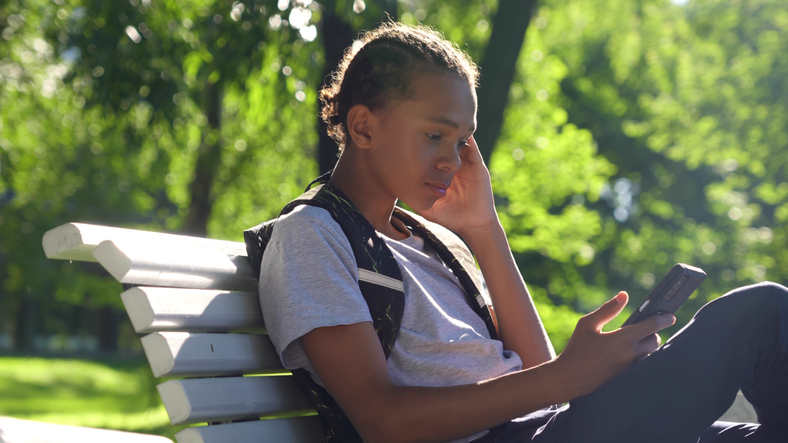
Source: Anatoliy Gruzdev / Getty
If you have or know a child or a teenager, you already know they spend a good amount of their free time with their nose buried in a phone, scrolling through various apps and barely looking up from their social media feeds.
Now, the Surgeon General of the United States, Dr. Vivek Murthy, has issued an unprecedented warning – that social media usage is harming children and teenagers and that adults should better regulate their children’s screen time. That’s if they can put the phones and tablets down themselves (our words, not his.)
“That’s a lot to ask of parents, to take a new technology that’s rapidly evolving and that fundamentally changes how kids perceive themselves,” Murthy said in an interview with the New York Times. “So we’ve got to do what we do in other areas where we have product safety issues, which is to set in place safety standards that parents can rely on, that are actually enforced.”
In the advisory Social Media and Youth Mental Health, Murthy writes, “There are ample indicators that social media can also have a profound risk of harm to the mental health and well-being of children and adolescents.”
Advisories are issued to bring “the American people’s attention to an urgent public health issue and provides recommendations for how it should be addressed,” the report reads. “Advisories are reserved for significant public health challenges that require the nation’s immediate awareness and action.”
The advisory uses available research to draw its conclusions citing the concerns from “researchers, parents and caregivers, young people, and healthcare experts,” about the impact of social media.
Social media use is prevalent and its risk factors haven’t been comprehensively studied. The advisory says that “up to 95% of youth ages 13–17 report using a social media platform, with more than a third saying they use social media ‘almost constantly.'”
While most social media platforms require a minimum age of 13 to log in, the report shows usage by children ages eight to 12 is at almost 40%.
The report acknowledges that social media has its positive benefits including connecting children and teens through affinity groups and allowing more introverted teens to make friendships. But because children 10-19 years old are in a significant phase of brain development, the advisory says that brain development at those ages “is especially susceptible to social pressures, peer opinions, and peer comparison,” and that it could lead to brain changes in areas that regulate impulse control and emotional regulation and that it makes children and teens more sensitive to both “social rewards and punishments.”
Depression, suicidal ideation, negative body images and sleep disruption, which interrupts critically important times in childhood development, cyberbullying, sexual exploitation and exposure to explicit and violent imagery are just some of the issues that are even more significant for children and teens already at risk.
One of the more interesting findings referenced in the advisory pertains to the staggered rollout of Facebook in 2004. Researchers say that allowed them to examine how rates of reported depression increased as the social media app was made available to students. That study says that it’s possible that one of the first major social media apps in circulation could have increased depression in over 300,000 students.
Tech titans like Facebook founder Mark Zuckerberg, Apple CEO Tim Cook and others in the space have set limits on their own children’s interactions on social media.
Murthy’s report says that stakeholders including parents, researchers, teachers, children and teens policymakers and tech companies should work together on setting limitations, reducing access, monitoring children and teens for negative impact, asking for help, modeling certain behaviors, and potentially creating checks and balances in policy and in practice for social media usage.
In conclusion, the advisory says, “We do not yet have enough evidence to determine if social media is sufficiently safe for children and adolescents.”
Until we do, it warns, we must all do our due diligence to try to make it safer.
See how social media is reacting to the news below.








